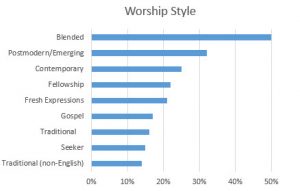 The Ecumenical Partners in Outreach collaborated with the Center for Progressive Renewal to conduct the largest study (so far this century) of church planting activities in the major mainline churches of the US and Canada. A 12 page summary of findings, available online free of charge, highlights eight key insights.
The Ecumenical Partners in Outreach collaborated with the Center for Progressive Renewal to conduct the largest study (so far this century) of church planting activities in the major mainline churches of the US and Canada. A 12 page summary of findings, available online free of charge, highlights eight key insights.
Insight #7 Worship Matters (p.11)
Time spent on worship relates strongly to growth, at least among
traditional and new immigrant churches. Among alternative churches
trying to link with young adults, there was some negative relation.
THIS MEANS:
- Worship is still one of the first and most important elements of how people encounter God and Christian community. Worshiping well leaves people with a strong positive experience that can bring them back to experience the rest of your church’s life.
- Too much attention to worship may take away from time to nourish other elements of church life, especially parts that appeal to young adults (like one-to-one relationships).
The study also found
- The most common worship style was blended followed by post-modern/emerging.
- Nearly 1 out of every 2 worshiping communities (45%) celebrate Communion/Eucharist/Lord’s Supper on a weekly basis.
So What?
The worship wars ended long ago (although admittedly I still encounter folks who never got that news!). The worship reality among new mainline communities recognizes the importance of context and seeks to craft authentic expressions that resonate with and are relevant to newcomers. Overall these findings suggest a more informal worship is common, which is consistent with the recently released findings of the third wave of the National Congregations Study (it shows a shift among all churches – existing as well as new church plants – toward informal worship).
Research from what is happening and especially about what is working well in new church starts in the mainline should inform existing mainline congregations in
- planning for innovation within existing worship services and creating additional worship services (especially those of styles that differ from that of the existing options), and
- determining what new church starts and similar worship initiatives beyond the local church to fund/support.
Worship matters for both new church starts and existing congregations. For those readers affiliated with an existing mainline congregation (one founded ten or more years ago), how well do you feel your congregation is doing in leveraging data about what is happening in mainline church starts for the two areas mentioned above? (If you have no idea, consider sharing this blog post with your pastor or a member of your Church Board/Council/Session.)